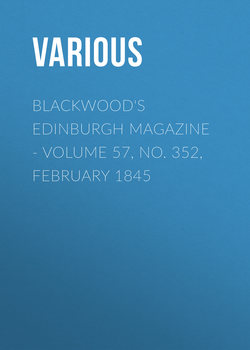Читать книгу Blackwood's Edinburgh Magazine - Volume 57, No. 352, February 1845 - Various - Страница 4
THE TOWER OF LONDON. — A POEM Part II
ОглавлениеWhat sudden blaze spreads through the crimson skies,
And still in loftier volumes seems to rise?
What meteor gleams, that from the fiery north,
In savage grandeur fast are bursting forth,
And light your very walls? Tell me, ye Towers —
'Tis Smithfield revelling in his festal hours,
Fed with your captives: shrieks that wildly pierce
The roaring flames now undulating fierce,
And gasping struggles, mingled groans, proclaim
The power of torture o'er the writhing frame.
Dark are your dens, and deep your secret cells,
Whose silent gloom your tale of horrors tells.
Saw ye how Cranmer dared — yet fear'd to die,
Trembling 'mid hopes of immortality?
He stood alone; — a brighter band appears
Unaw'd by threats — impregnable to fears;
Who suffer'd glad the sacred truth to spread,
In mild obedience to its fountain-head.
And when at length our popish James would see
Cold superstition bend th' unhallow'd knee,
The mystic tapers on our altars burn,
And clouds of incense shade the fragrant urn,
Shone England's prelates faithful to their call,
In bonds of truth within thy massive wall.
See grace divine — see Heaven in mercy pour,
The balm of peace on Albion's boasted shore.
Once wrought by captive fingers on thy wall,
The hero's home and prison, grave and pall,
What dark lines meet the startled stranger's gaze,
Thoughts that ennoble — sentiments that raise
The iron'd captive from captivity,
How high above the power of tyranny! —
And ye that wander by the evening tide,
Where mountains swell or mossy streamlets glide;
That on fresh hills can hail morn's orient ray,
And chant with birds your grateful hymns to day;
Or seek at noon, beneath some pleasant shade,
To feel the sunbeams cool'd by leafy glade —
That free as air, morn, noon, and eve, can roam,
Where'er you list, and nature call your home;
Learn from a hopeless prisoner's words and fate,
"Virtue is valour — to be patient, great!"
When traced on prison walls, such words as these
Arrest the eye — appall e'en while they please —
"Ah! hapless he who cannot bear the weight,
With patient heart of a too partial fate,
For adverse times and fortunes do not kill,
But rash impatience of impending ill."
Yes, still they speak to bosoms that are free
Within the girdle of captivity;
Of spirits dauntless, who could spurn the chain
Of human punishment or mortal pain;
That e'en amid these precincts of despair,
Dared free themselves from thraldom's jealous care —
Bound but by ties of faith and virtue, be
Heirs of bright hopes and immortality.
Oh! great mind's proud inscriptions! Who shall tell
What hand engraved those lines within that cell?
What heart yet steadfast while around him stood
Phantoms of death to chill his curdling blood,
Could battle with despair on reason's throne,
And conquer where the fiend would reign alone?
Ah! who can tell what sorrows pierced his breast —
Ran through each vein, usurp'd his hours of rest?
What struggle nerved his trembling hand to trace
With moral courage words he dared to face
With acts that ask'd new efforts while he wrote
To man his soul and fix his every thought!
Tremble, thou tyrant! proud ambition, blush!
Hearts such as these thy power can never crush.
Are they forgotten? no, the rugged stone,
The lap of earth on which they rested lone;
The very implements of torture there —
The axe, the rack, the tyrant's jealous care;
Each mark that meets successive ages' eyes
Speaks, trumpet-tongued, a fame that never dies;
And tells the thoughtful stranger, while the tear
Unbidden starts, that freedom triumph'd here —
Plumed her immortal wings for nobler flight,
And bore her martyr'd brave to realms of light.
Nor false their faith, nor like the fleeting wind,
Their spirits fled! for theirs the unprison'd mind,
No tyrant-chains, no bonds of earth and time,
Could hold from truth and freedom's heights sublime —
From that bright heaven of science, whence they shed
Fresh glory o'er man's cause for which they bled.
Ask what is left? their names forgotten now?
Their birth, their fortune? not a trace to show
Where sleeps their dust? Go, seek the blest abode,
Their mind's pure joy, the bosom of their God!
Then tell if in the dull cold prison's air,
And wasted to a living shadow there,
Earth scarcely knew them! if they were alone
Where they were cast, to pine away unknown?
Friends, had they none? nor beam'd a wish to share
Love, friendship, and to breathe the common air.
Lost, lost to all! like some lone desert flower,
Felt they unseen Time's slow consuming power,
And hail'd each parting day with fond delight,
As the tired pilgrim greets the waning light?
No! glad bright spirits, guardians of the mind,
Were with them; as the demon-powers unbind
And lash their furies on the conscious breast
Of earth's fell tyrants who ne'er dream of rest.
Theirs, too, joy's harbinger, the thoughts aye fed
With brighter objects than of earth, that shed
A light within their narrow home, and gave
A triumph's lustre to the yawning grave.
And in that hour when the proud heart's o'erthrown,
And self all-powerless, self is truly known;
When pride no more could darken the free mind,
But all to God in firm faith was resign'd —
Then drank their souls the stream of love divine,
More richly flowing than the Eastern mine;
Felt heaven expanding in the heart renew'd,
And more than friends in desert solitude.
Peace to thy martyrs! thou art frowning now
With all the array of bold and martial show;
The same thy battlements with trophies dress'd,
Present defiance to the hostile breast;
